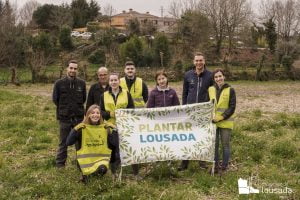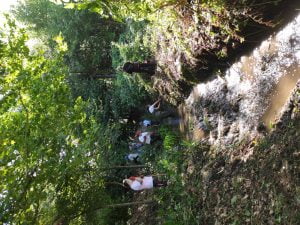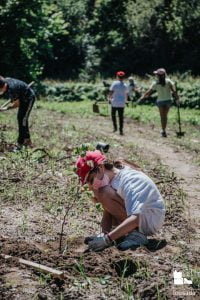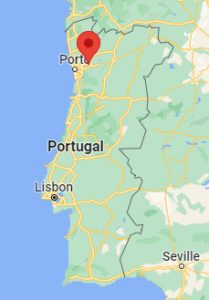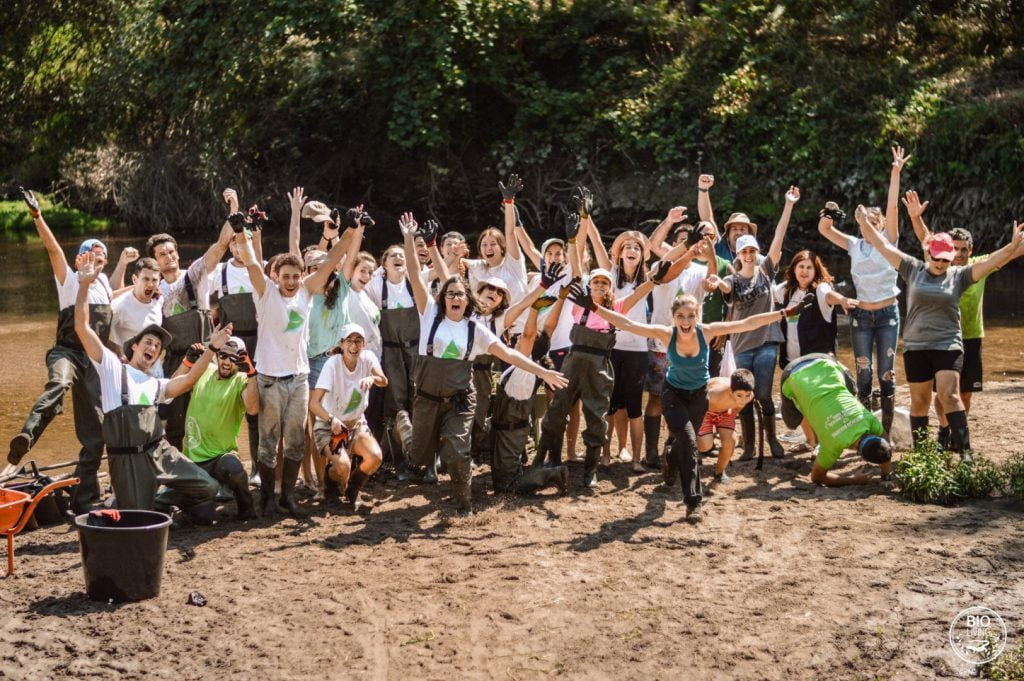Lousada Guarda RIOS is a project that aims at the protection of watercourses, through the mobilization of volunteer patrols and ecological restoration actions done with the help of volunteers.
About the Lousada protecting RIVERS
Watercourses are amongst the natural systems most used by Man and have suffered intense pressures through, for example, the construction of dams, unregulated water extraction, industrial and domestic pollution, the introduction of exotic species, and agricultural practices that lead to the destruction of habitats and eutrophication of water.
Lousada Protecting RIVERS intends to involve local communities in a program of volunteer monitoring of the ecological state of the rivers and streams of Lousada, through the adoption of river or stream sections of 250m for vigilance and the participation in cleaning and environmental improvement actions, such as the removal of invasive plants or the planting of trees.
Participants organize “Protecting RIVERS” patrols and receive training on ecology, good environmental and volunteering practices and become “ambassadors” of the project and of good environmental conduct.
Regular vigilance and monitoring of small stream sections allow for a more effective and faster intervention of the municipal staff or legal authorities to solve any ecological issues that are reported by the volunteers.
The main stakeholders are common citizens, the municipality and the parish councils. Private companies, scouts and sports clubs also often join and participate in volunteering activities. Legal authorities such as the local Police, the armed environmental protection patrols and the Portuguese National Agency for the Environment take part as formal inspectors and law enforcement for reported lingering issues regarding, for example, water pollution.
Duration of the Good practice
2018 – ongoing
The main institution in charge of the Good practice
Municipality of Lousada, Portugal
Milene Matos
T: +351 255 820 500
E: lousada.ambiente@cm-lousada.pt
W: cm-lousada.pt/p/lousadaguardarios
The geographical scope of the Good practice
Local (municipal)
Location of the practice
Lousada, North, Portugal
Resources needed
The cost of a similar project will depend on the extension of watercourses covered and the number of volunteers engaged. The presented results are for our case, with 52km of watercourses and about 600 regular volunteers.
Human resources: one full-time technician/coordinator, plus regular managers and administrators at the office.
Funding (besides human resources): about 15.000 €/year for materials, tools, safety gear, insurance, light meals for volunteers, communications and consumables.
Other needs: Volunteers are fundamental for the implementation of a similar project. They must be trained and equipped with safety gear, identification clothing and the required material for monitoring the water streams.
Evidence of success
Lousada protecting RIVERS has become an award-winning Portuguese national good practice in the topic of water protection, rivers restoration and community engagement. So far, the results are the following.
- 52 km of water streams characterized
- 66 sections of 250m of stream adopted by volunteer patrols
- Over 900 volunteers
- Over 20 training actions delivered
- Publication of a “Protecting RIVERS Handbook” with good practice in cleaning and maintaining rivers, and with safety measures for volunteers
- Over 1600 trees were planted in the river margins
- Over 13000 L of litter removed from the water
- Over 50 volunteering activities organized by the Municipality
- Over 130 formal inspection processes, with the legal authorities
Challenges encountered
The biggest challenge is to convince older private landowners (whose properties have a water stream crossing) to implement ecological good practices in their river maintenance procedures. Old habits die hard and environmental education is needed for all ages.
Communication in close proximity and face-to-face settings is key to having people trusting the project, its intentions/objectives and its staff.
Potential for learning or transfer
An approach similar to this project may be an excellent way to diagnose and improve the ecological condition of rivers and water streams, in any part of the world.
Know the landscape: before engaging any volunteers or doing any field action, it is imperative to properly characterize all water streams that will be targeted in the project. Aspects such as access, main issues, water quality, margins integrity and others are very important to know beforehand. This characterization allows for the division of the water stream into shorter bits (in our case, of 250 m), that can be made available for volunteer adoption/monitoring.
It is key to properly train the volunteers with basic ecological concepts, species identification, and notions of health and safety.
It is very important to provide volunteers with a monitoring sheet so that all information gathered may be compared across moments and places, limiting the subjective interpretation of what is registered.
The involvement of official authorities empowers the volunteers and makes the local community more aware and responsible for their rivers.
The volunteers feel appreciated if they receive tailored training, respecting their previous knowledge and understanding of the stream they adopted. They are also motivated by some surprises or goodies, such as a t-shirt or an unexpected light meal. The expected materials are the ‘volunteer kit’ that proved very useful to create a team spirit. The kit includes a bag with monitoring sheets, a handbook, a pencil/pen, and identification/safety vest and materials needed for the monitoring.
Regular advertising/dissemination of the actions completed under the programme is very important for volunteers to feel recognized and publicly praised.
It is more effective to have a ”main face” that volunteers can identify and refer to as the project coordinator, instead of having many technicians involved, that are not able to interpersonally connect with the volunteers, the landowners and the general community.
How to start?
Funding
Lousada protecting RIVERS is self-funded by the Municipality. The water company “Águas do Norte” sponsors the ecological maintenance of 2 km of river.
Partners
- NGOs
- Corporate volunteering groups
- Legal authorities and law enforcement (local Police, environmental agencies)
- Families and common citizens
- Schools
Volunteer training
Training of volunteers is very important in a similar project, as an important part of the initiative relies on the volunteers’ monitoring and reporting competencies.
The volunteers who adopt water streams for monitoring (Patrols) receive in-room and field training on the following topics:
- Aquatic ecosystems
- Water availability and quality
- River biodiversity, including the identification of native, exotic and invasive species
- Environmental threats
- Ecological restoration procedures
- Health and safety
- Reporting and monitoring
